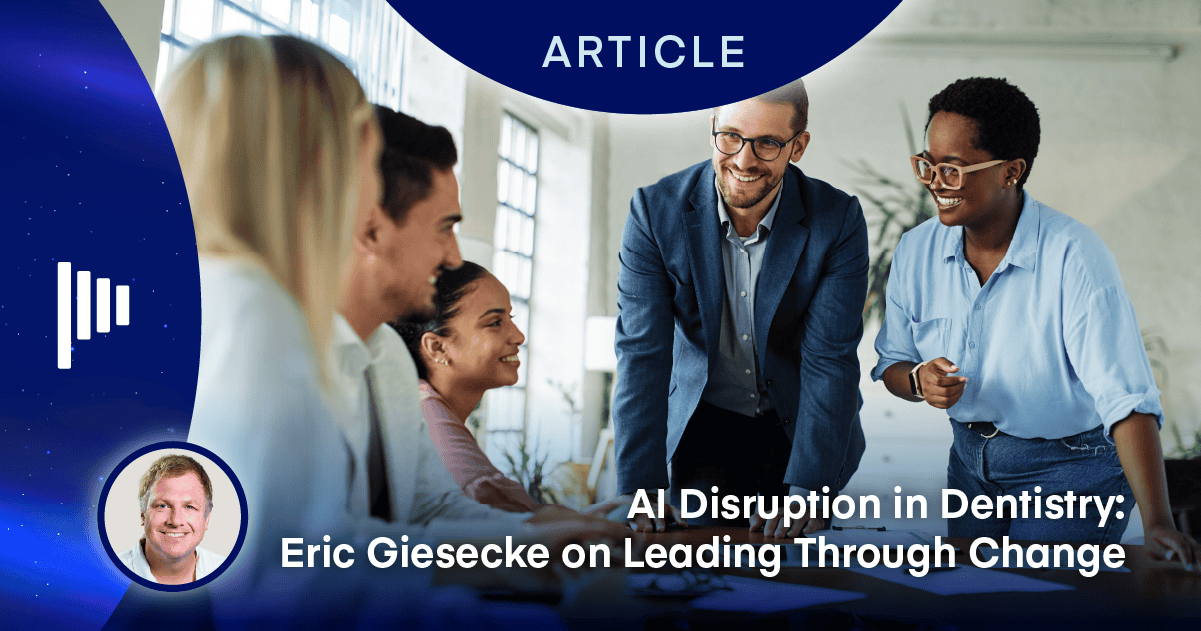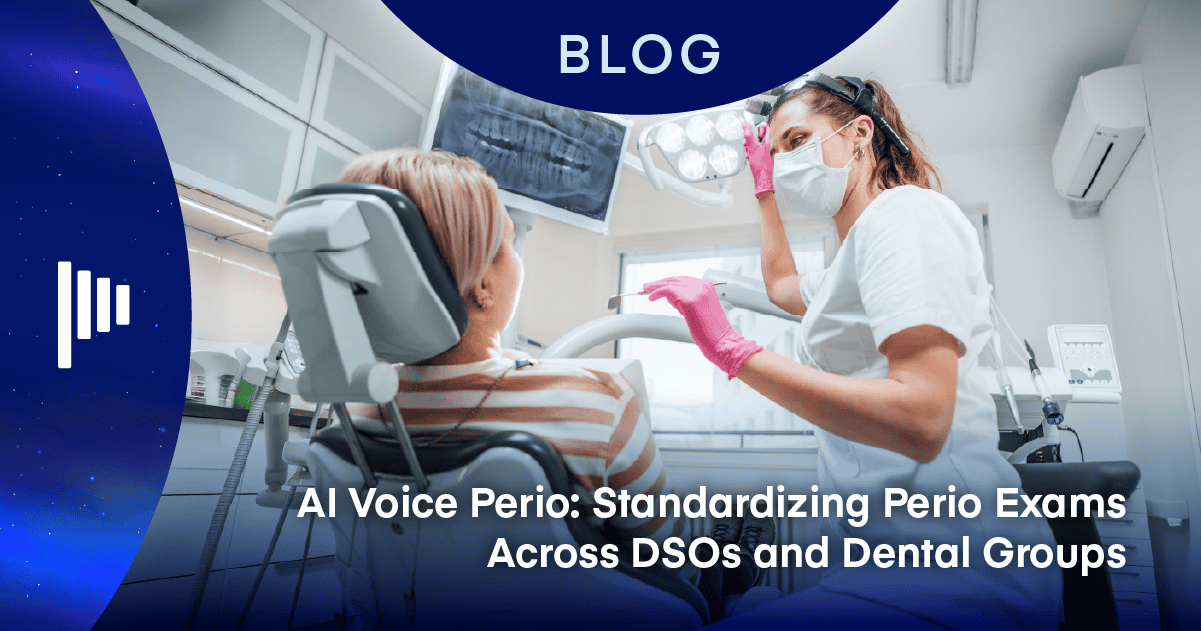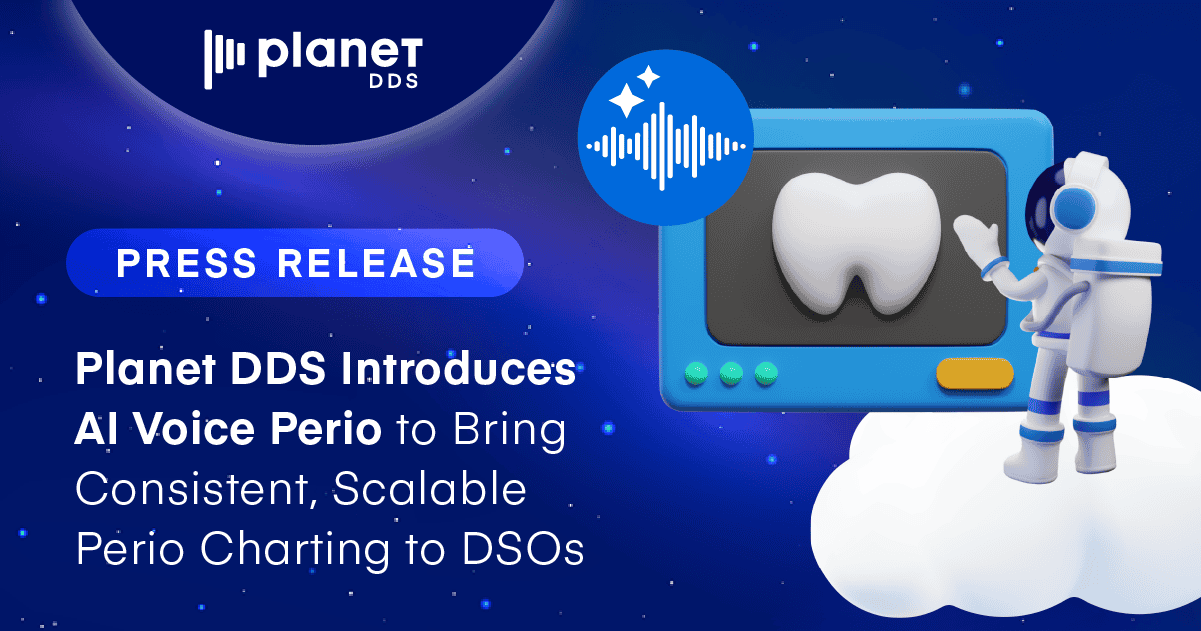AI Disruption in Dentistry: Eric Giesecke on Leading Through Change

Artificial Intelligence is accelerating change across industries, influencing how people work, how businesses grow, and how decisions get made. With its rapid advancement, AI is causing disruption—for better or worse—in every field out there. While it promises efficiency and growth, it also brings challenges and uncertainties that dental professionals and businesses must address. What can dental support organizations (DSOs) and dental groups do to stay ahead as AI reshapes their industry?
This interview with Eric Giesecke, CEO of Planet DDS, originally appeared in Authority Magazine as part of their ongoing series on AI disruption. Giesecke brings a cross-industry perspective to the conversation, having transitioned from engineering and infrastructure to leading a cloud-based dental software company serving DSOs and dental groups across North America.
Building a Business with Purpose and Innovation
Q: Thank you so much for joining us in this interview series. Before we dive into our discussion our readers would love to “get to know you” a bit better. Can you share with us the backstory about what brought you to your specific career path?
A: My path to becoming CEO of Planet DDS was far from linear, but I’ve come to see that as one of my greatest strengths.
I started out with a degree in engineering, thinking I’d follow a more traditional technical career path. But early on, I realized that while I appreciated the problem-solving side of engineering, what truly energized me was leading teams, driving change, and building something meaningful from the ground up.
That realization took me to the construction industry, where I had the chance to work on large-scale infrastructure projects in places like Afghanistan and Egypt. I was in my twenties, managing projects well beyond my experience level at the time, but I loved it. Those years taught me a lot about leadership, resilience, and the impact of taking ownership.
After that chapter, I pursued an MBA and was drawn to entrepreneurship through the search fund model. I acquired a bottleless water cooler company, grew it substantially, and eventually sold it in 2017. This experience was my first hands-on role running a business and confirmed for me that I wanted to keep building companies, not just advising or investing in them.
That’s when a former business school colleague and I came across Planet DDS. At the time, neither of us had experience in dentistry or software, but we saw immense potential in the company. It had a solid product and loyal customer base, but it was early in its growth trajectory. We believed that with strategic investment, a focus on innovation, and the right leadership, it could scale into something much bigger.
Fast forward to today, Planet DDS now serves over half of the top DSOs in the country, hosts one of the largest dental databases in the world, and continues to play a key role in modernizing dental care through cloud-based solutions and AI. I may have started my career thinking I’d be solving engineering problems, but I’ve found that helping businesses grow, evolve, and serve their customers better is the challenge I was truly meant to take on.
What Sets Planet DDS Apart
Q: What do you think makes your company stand out? Can you share a story?
A: What truly sets Planet DDS apart is our culture and our commitment to meaningful innovation—and the two are deeply connected.
From day one, we’ve prioritized building a culture grounded in collaboration, accountability, authenticity, empathy, and trustworthiness. As we’ve grown, both organically and through acquisitions, we’ve worked hard to preserve that foundation. Our team operates with a strong sense of self-accountability, and without the red tape that often slows larger organizations. Everyone is empowered to make decisions, take initiative, and collaborate across functions.
This culture doesn’t just make Planet DDS a great place to work; it’s also a key driver of our innovation. One example of this is the launch of DentalOS™, a platform we built to address a widespread pain point in the industry: outdated, fragmented dental software systems. DentalOS is designed to be the operating system for the modern dental group. It allows practices to customize their tech stack, integrate best-in-class tools via open APIs, and future-proof their operations, similar to how iOS revolutionized the smartphone industry. Each new product we launch or innovation we make delivers purpose and impact.
We’ve also made it a priority to pair product innovation with insights that elevate the entire industry. Earlier this year, we released the 2025 Dental Industry Outlook Report, leveraging data from 3,400 dental practices to identify the trends, technologies, and strategies shaping the future. From AI-driven revenue cycle management (RCM) tools to staffing trends and patient experience insights, the report is a go-to resource for DSOs and group practices navigating a changing industry.
But perhaps what I’m most proud of is that we don’t view success solely in terms of business metrics. We see it in the impact we have on our people, our customers, and ultimately, on patients. At Planet DDS, our mission is simple: Dental software is broken, and we aim to fix it. We’re doing that by helping practices move beyond outdated systems and equipping them with a modern, cloud-based platform that actually scales with their growth. And while technology plays a big role in that, it’s the people behind the platform who bring that mission to life. That balance of culture, innovation, mission, and execution is what makes Planet DDS stand out.
Leading Through Values and Real-World Experience
Q: You are a successful business leader. Which three character traits do you think were most instrumental to your success? Can you please share a story or example for each?
A: Looking back on my journey, three qualities have been especially meaningful in shaping how I lead: willingness to do the work, humility, and authenticity. These aren’t buzzwords, they’re values I’ve tried to live by every step of the way:
1. Willingness to do the work
I’ve always believed that leadership starts by getting in the trenches. I had a significant amount of responsibility early in my career, overseeing large-scale construction projects in Afghanistan and Egypt. These experiences taught me to lean in, listen carefully, and lead by example.
That same mindset carried over when I entered the dental software space. This was an industry I had no prior experience in, so I didn’t assume I had all the answers. Instead, I spent time talking to employees, sitting in on team training sessions, and learning the inner workings of how our software was used day to day. That hands-on approach helped shape some of our most important product and service decisions, and, more importantly, built trust with our team and our customers.
2. Humility
When you’re building something as a team, there’s no room for ego. I’m proud of what we’ve accomplished at Planet DDS, but none of it would have been possible without the dedication and talent of the people around me.
One of the best things we’ve done as a company is grow through acquisition without losing our cultural core. That’s only possible when leaders are willing to step back and say, “We don’t have it all figured out. What can we learn from you?” I’ve found that the most effective leaders are the ones who shine a light on others, not themselves. When you lead with humility, you unlock better ideas, deeper relationships, and a far more resilient business.
3. Authenticity
People can tell when you’re putting on a front. I’ve always believed that leadership is most powerful when it’s real. That means being honest when something’s hard, clear when making decisions, and true to your values even when it’s inconvenient.
Whether I’m talking to our team, our customers, or industry partners, I try to show up as the same person every time. Try being consistent, transparent, and trustworthy instead of just being polished. That authenticity is what builds long-term credibility and keeps people aligned and engaged, even when the path forward isn’t easy.
How AI Is Changing the Dental Industry
Q: Let’s now move to the main point of our discussion about AI. Can you explain how AI is disrupting your industry? Is this disruption hurting or helping your bottom line?
A: AI is fundamentally reshaping the dental industry, and I’d argue it’s doing so in the best way possible. At Planet DDS, we see AI not as a disruption to be feared but as a powerful enabler of better care, greater efficiency, and smarter business operations. The impact is being felt most clearly in two areas: diagnostics and workflow automation.
On the diagnostics front, AI is elevating dental imaging by turning it into a more intelligent, real-time tool for decision-making. Our Apteryx imaging software plays a key role here. As a cloud-based platform, it enables clinicians to access and review patient images from anywhere, share them across practices, and, importantly, integrate seamlessly with AI-powered imaging solutions like Overjet, Pearl, and VideaHealth.
These integrations empower dental teams with clinical decision support that enhances diagnostic accuracy and consistency. AI tools automatically detect pathologies in radiographs and provide context to guide treatment recommendations. This doesn’t replace the dentist’s judgment—it supports it—offering an added layer of confidence and helping to build patient trust through transparency and precision.
Equally important is what’s happening behind the scenes with workflow automation. Administrative complexity is one of the biggest burdens in dentistry today. From insurance verification to claims submission to scheduling, staff are overwhelmed by time-consuming manual tasks. AI is starting to lift that burden, automating routine processes, improving accuracy, and freeing up team members to focus on patient care.
At Planet DDS, we’re embedding AI into our dental practice management platforms to make these tasks smarter and more efficient, whether it’s through automated reminders, predictive scheduling, or streamlined RCM tools that reduce claim denials.
So, is AI disrupting our industry? Absolutely, but it’s a positive disruption. It’s helping practices run more efficiently, improve care delivery, and remain competitive in an increasingly complex environment. And for us, it’s not hurting the bottom line, it’s strengthening it. By aligning our technology roadmap with the shifting needs of dental professionals and patients, we’re simultaneously creating more value for our customers and building a stronger, more resilient business in the process.
Elevating Diagnostics with AI-Powered Imaging
A: Which specific AI technology has had the most significant impact on your industry?
AI-powered imaging has had a game-changing impact on dentistry, especially when it comes to increasing diagnostic confidence and improving patient understanding. It’s taken what was once a subjective process—interpreting X-rays—and made it more consistent, visual, and data-driven.
Today’s AI tools can highlight decay, bone loss, and other abnormalities directly on the image, giving providers clearer insights and offering patients a visual explanation that builds trust. One of the biggest advantages is that AI consistently catches subtle changes and early indicators that even experienced clinicians may overlook, especially in busy, high-volume practices. These are often the kinds of details that can make the difference between early intervention and more complex treatment later on.
That clarity is key in a field where trust drives outcomes. Case acceptance today averages 57% across practices, leaving significant room for improvement. AI doesn’t just enhance diagnostics, it helps practices close that gap by building patient confidence and increasing buy-in.
We’ve invested heavily in making this technology accessible through our Apteryx® platform, which integrates with leading AI tools. Practices using these systems report higher case acceptance and fewer missed cavities on bitewings, proving that smarter imaging can improve both clinical care and business performance.
Recognizing the Turning Point for AI
Q: Can you share a pivotal moment when you recognized the profound impact AI would have on your sector?
A: For a long time, dentistry has been slow to adopt advanced technologies like AI. Compared to other industries, it’s been a tech laggard, heavily reliant on legacy systems and hesitant to change. But the moment it clicked for me that AI could truly transform the sector was when we saw how collaboration across companies, through open APIs and shared platforms, could make adoption seamless.
One example is the development of DentalOS™, our cloud-based platform designed to integrate best-in-class tools through an open ecosystem. With DentalOS, AI tools can plug directly into a practice’s workflow, without needing to overhaul their entire system. That flexibility is key. It means AI can be layered on top of existing infrastructure to solve real problems, from diagnostics to patient communication, without adding friction. It was in building DentalOS and watching these partnerships come to life that I realized AI wasn’t just hype and that it had the potential to redefine efficiency, scalability, and patient care across the dental landscape.
But there’s still work to do. Not every practice is there yet, and the industry still has some catching up (and convincing) to do. But the foundation has been laid, and AI is quickly becoming less of a “nice to have” and more of a competitive necessity.
Preparing Teams for Practical AI Adoption
Q: How are you preparing your workforce for the integration of AI, and what skills do you believe will be most valuable in an AI-enhanced future?
A: Preparing our workforce for AI isn’t just about teaching people how to use new tools; it’s about building confidence, clarity, and buy-in. That starts with making sure our team understands not just what the technology does, but why it matters and how it can make their work more impactful and efficient.
At Planet DDS, we take a continuous training approach, rather than a one-time rollout. We provide hands-on onboarding, real-world use cases, and ongoing support so teams feel empowered, not overwhelmed. We also make sure to frame AI as a support system, not a replacement, which helps team members at all levels see how it can reduce repetitive tasks, minimize errors, and ultimately improve the experience for both staff and patients.
As for the skills that matter most in an AI-enhanced future, I believe adaptability, digital fluency, and cross-functional collaboration are key. The pace of change will only accelerate, and the most valuable employees will be those who can evolve with it and are comfortable learning new systems, asking the right questions, and working across teams to connect insights from both tech and human perspectives. AI is an ongoing transformation. Our job as leaders is to create a culture where people are supported through that evolution and excited about the possibilities it brings.
Tackling Resistance and Closing Skill Gaps
Q: What are the biggest challenges in upskilling your workforce for an AI-centric future?
A: One of the biggest challenges is human, not technical, and that’s overcoming the natural resistance to change. AI can feel intimidating, especially in industries like dentistry where workflows have been stable for decades. People wonder, Will this replace me? Will I need to relearn everything I know? So a big part of upskilling is helping teams move from hesitation to curiosity and, ultimately, to confidence.
Another challenge is meeting people where they are. Not every employee comes in with the same level of comfort around new technologies. You may have team members who are naturally tech-savvy and excited to dive in, and others who need more context and hands-on time. That’s why focus on making AI training accessible, relevant, and role-specific is important so it’s not just theory, but something they can use in their day-to-day work.
We also need to make sure AI upskilling stays aligned with our broader business goals. If employees see AI training as a separate initiative instead of a tool that helps them work smarter, it won’t stick. Try to connect the dots clearly: Here’s how this tool helps reduce claim errors, here’s how it gives patients clearer visuals, and here’s how it frees up time to focus on care. And, like I said previously, AI is evolving quickly, which means upskilling can’t be a one-and-done effort. The learning curve keeps shifting, and so does the tech. That’s a challenge but also an opportunity. It pushes us to build a culture where learning is ongoing, and where staying up to speed isn’t just encouraged but expected.
In the end, the biggest challenge is also the biggest reward: helping people grow alongside new technology. Because when that happens, both the workforce and the dental business become more resilient, more efficient, and more future-ready.
Building Trust Through Ethical AI
Q: What ethical considerations does AI introduce into your industry, and how are you tackling these concerns?
A: Data privacy, security, and regulatory compliance are absolutely critical in the dental industry. Any AI solution handling patient information must meet the highest standards for protecting that data.
At Planet DDS, we take that responsibility seriously. We’re proud to be the first dental practice management solution provider to achieve SOC 2 Type II certification across all of our products and organization wide, which reflects our rigorous approach to security, availability, and privacy. That’s in addition to maintaining full HIPAA compliance across our platform and working only with partners who meet the same standards.
Ultimately, AI in healthcare must be built on trust. By prioritizing ethical data practices and transparency, we ensure that AI enhances, not compromises, that trust for both providers and patients.
Five Strategies for Embracing AI in Dentistry
Q: What are five things you need to do as AI is disrupting your industry? If you can, please share a story or an example for each.
1. Prioritize AI that solves real problems.
Focus on tools that drive tangible results, whether it’s improving diagnostic accuracy, streamlining workflows, or enhancing patient communication.
2. Invest in training and change management.
adoption won’t succeed without internal buy-in. Equip your teams with practical training and show them how these tools will make their day-to-day work easier, not harder.
3. Utilize open APIs and ensure seamless integration.
AI shouldn’t disrupt existing workflows; it should enhance them. That’s why we built DentalOS™ as an open platform so practices can plug in the tools that work best for them without being locked into a single vendor or forced to overhaul their entire tech stack. This flexibility empowers them to grow and scale in the ways that make the most sense for their unique needs.
4. Address ethical and data privacy concerns proactively
In healthcare, data protection is essential. We’ve prioritized HIPAA compliance and achieved SOC 2 Type II certification to ensure our AI-powered tools meet the highest standards of trust and security.
5. Stay agile and keep evolving
AI is advancing fast. Keep listening to your customers, stay flexible in your approach, and be ready to iterate. The real value of AI comes from continuously adapting to meet the needs of your industry.
Debunking AI Misconceptions in Clinical Care
Q: What are the most common misconceptions about AI within your industry, and how do you address them?
A: One of the biggest misconceptions is that AI is here to replace human decision-making, especially in clinical settings. In reality, AI in dentistry is designed to support and enhance the expertise of providers, not replace it.
For example, AI-powered imaging tools can detect signs of decay or bone loss with impressive accuracy, but they don’t make the diagnosis or decide on a treatment plan. That’s still in the hands of the dentist. What AI does is add a layer of consistency, speed, and visibility, helping clinicians feel more confident and patients feel more informed.
We try to address this head-on by being transparent with our teams and our customers: AI is a collaborative tool, not a threat. When framed that way, it becomes much easier to see its value in improving outcomes and building trust without compromising the human element that defines great care.
AI Disruption as an Opportunity
Q: Can you please give us your favorite life lesson quote? Do you have a story about how that was relevant in your life?
A: One idea that’s really shaped how I think as a leader comes from The Innovator’s Dilemma by Clayton Christensen: “Disruptive technology should be framed as an opportunity, not a threat.”
That mindset has stuck with me, especially leading a company in an industry like dentistry, where innovation doesn’t always come easily. When we acquired Planet DDS, the industry was still very much tied to legacy systems. But we saw that as a chance to do things differently, whether that meant embracing the cloud early on or integrating AI in ways that improve care and reduce complexity.
I’ve learned that as a leader, you have to be willing to challenge the status quo and help your team see that change, even disruptive change, can be a catalyst for growth. That lesson has guided me in everything from building DentalOS to forming partnerships with AI innovators. It’s not always easy, but it’s almost always worth it.
Balancing Speed, Strategy, and Purpose
Q: Off-topic, but I’m curious. As someone steering the ship, what thoughts or concerns often keep you awake at night? How do those thoughts influence your daily decision-making process?
A: What keeps me up at night is making sure we’re moving fast enough to stay ahead without losing sight of our people and our purpose. The pace of change in technology, especially with AI, is accelerating, and I’m constantly thinking about how we can grow while still staying grounded in who we are and the value we bring to our customers.
That balance between innovation and intentionality influences how I lead. It pushes me to ask whether we’re building for the long term, whether our teams feel supported through change, and whether we’re truly helping practices deliver better care. Those are the questions that guide my decision-making every day.
Driving Access and Impact Through Smarter Tools
Q: You are a person of great influence. If you could start a movement that would bring the most amount of good to the most amount of people, what would that be? You never know what your idea can trigger.
A: If I could start a movement, it would focus on making dental care more accessible. Oral health is a key part of overall health, yet millions of people still struggle to get the care they need, often due to cost, location, or lack of follow-through.
Our 2025 Dental Industry Outlook Report highlights the gap. While many patients are diagnosed and presented with treatment plans, only 57% accept that treatment and just 42% complete it. Nearly 8% don’t show up for appointments at all, and only six out of ten return for regular hygiene visits within a year. These numbers tell a bigger story about the barriers patients face, and they underscore the opportunity we have as an industry to do better.
Technology won’t solve access on its own, but it can help. At Planet DDS, we’re working to equip practices with cloud-based platforms, AI-powered diagnostics, and tools that reduce administrative burden and help providers deliver care more efficiently. If we can help practices scale smarter and reinvest in their communities, we can start to close the gap and bring better oral health within reach for more people.
Empower Dental Care Through AI
As Eric Giesecke explains, AI is reshaping how dental organizations approach diagnostics, daily operations, and workforce development. The opportunity for DSOs and dental groups lies in adopting tools that improve performance while preserving the core values of care, trust, and culture. When implemented with intention, AI can strengthen every part of the organization, from technology and systems to patient experience and team engagement.
Contact Planet DDS to learn how our dental practice management and AI solutions can support your next phase of growth.



